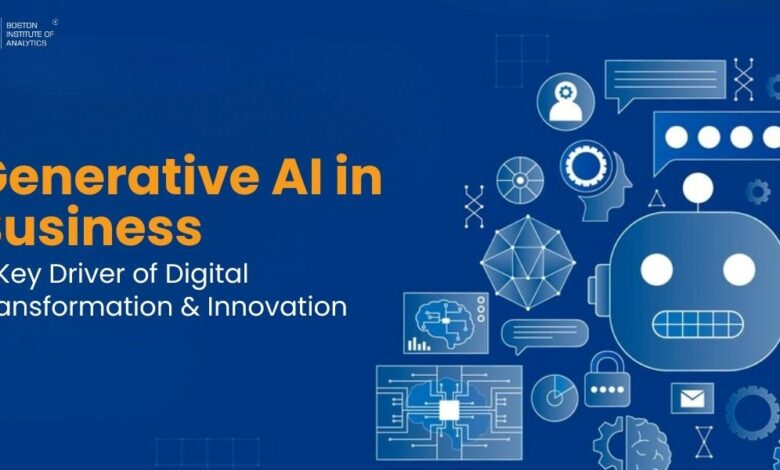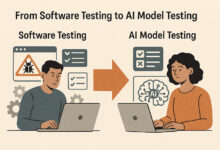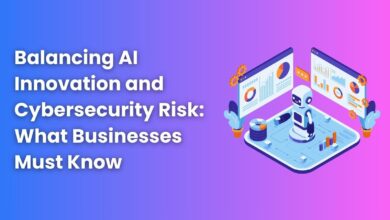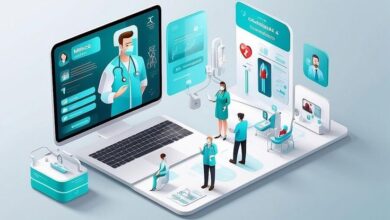Generative AI for Businesses: Trends Transforming Marketing and Productivity

The year 2026 is a crucial turning point for corporate technology. Generative AI (GenAI) has gone from being the novelty and rapid experimentation tool to a reliable and indispensable part of the company’s infrastructure. It is now a matter of how soon a company can re-engineer its main processes to gain the full extent of GenAI benefits in marketing effectiveness and organizational productivity rather than if a company should adopt GenAI.
The major trends which are leading this revolution Hyper-Personalization, Agentic Automation, and the need for Responsible AI Governance are changing the nature of work and causing a demand for new skills. To professionals who wish to remain in the loop, attending a specialized Generative AI Course is no longer an option but a must for career advancement in this fast-changing area.
Marketing: The Dawn of Hyper-Personalization at Scale
The maximum visible and immediate change is occurring in marketing. Generative AI tools are letting brands to execute the long-promised, yet archaeologically challenging, goal of true personalization at an extraordinary scale and speed.
- Dynamic, Multimodal Content Creation
The mixing of different contents like writing, making graphics, and editing videos has become easier. Now, AI content-generating tools can create original, excellent, and suitable for the brand content in just a few minutes:
- Copywriting: Jasper and Copy.ai are among the tools that come up with hundreds of different subject lines, ad creatives, and product descriptions which are made stricter for various demographics and platforms. As a result, the efficiency of marketing has tremendously improved.
- Visuals: Creative software such as Midjourney and Adobe Firefly help marketers to make realistic and custom images and even banners with just a text prompt, thus speeding up the creative testing process.
- Video: AI in video production like Synthesia could recognize a basic blog post and convert it into a narrated video with a specific AI avatar and even provide the voice in the language of your choice, thus, facilitating the creation of new audience engagement channels.
- Intelligent Targeting and Real-Time Ad Optimization
GenAI is revolutionary in performance marketing. It does not stop with just audience segmentation but creates hyper-personalized campaign components by firstly analyzing behavioural data in real-time.
- Dynamic Creative Optimization (DCO): Machine learning generated ads and their variants (like images, headlines, and calls-to-action) are tested hundreds at a time automatically and simultaneously. The best-selling versions get the funding from the whole budget divided by the algorithm instantly thus nurturing financial returns and encouraging the sales rates to grow.
- Answer Engine Optimization (AEO): Search engines like Google and others introducing AI Overviews (AIOs) means the marketing strategies need no longer settle for traditional SEO keywords but should rather be targeting AI-generated snippets, clear factual responses, and comprehensive topic depth.
- Hyper-Personalized Customer Journeys
From the instant a visitor arrives at a site till he/she/they get a follow-up email, GenAI guarantees a personalized journey every step of the way:
- Personalized Landing Pages: AI is capable of changing the structure, changing the shown products, and changing the landing page calls-to-action according to what user has been searching for or who has sent him/her to the site. This can result in more user engagement and conversions.
- Advanced Conversational Commerce: AI-driven chatbots, which are based on large language models (LLMs) like GPT or Gemini, continuously work like humans and are available all day, every day. They are capable of answering intricate questions, suggesting products, and leading customers through the sales process, which all results in a big boost in customer satisfaction and a significant decline in operational costs.
Productivity: The Rise of Agentic Automation and AI Co-Pilots
The external transformation aspect of marketing is what the world sees while the internal impact of Generative AI is a silent revolution in productivity and workflow efficiency which is largely powered by AI Agents.
- From Chatbots to AI Agents
The transition from single-step tools (like a plain content generator) to multi-step AI Agents is the most notable development in Generative AI for business productivity.
- Definition: AI Agents refer to advanced systems developed from foundation models that have the capability to independent plan and carry out a certain sequence of actions through various tools and platforms in order to realize a complex goal.
Use Cases:
- Automated Research: For example, if you give an agent the task to ” investigate the competition for our new product”, it will autonomously perform a series of actions which will include searching the web, writing a summary of the findings, creating a SWOT analysis, and making a PowerPoint slide deck.
- IT Service Desk: Agents are already taking care of simple service-desk requests, diagnosing typical problems, and even fixing code without any human involvement, and this is resulting in significant reductions in operating costs.
- The Universal Co-Pilot Model
Generative AI is being incorporated into the interface of almost every big software package, from Microsoft, which has introduced Copilot, to Google, which is working on Gemini for Workspace. This “co-pilot” model reshapes the future of knowledge work:
- Code Generation: Code generation, debugging and real-time completion of code snippets by GitHub Copilot and similar tools in the hands of developers, would mean faster development and better quality of code.
- Data Analysis and Reporting: The role of business analyst is used to slow down the decision-making process but with natural language prompts the analyst can analyze huge datasets, create charts and render complex findings into reports that are much easier to read.
- Sales Enablement: AI takes care of the creation of hyper-personalized outreach emails and sales proposals, which means that the most time-consuming parts of lead generation and follow-up are now out of the sales team’s hands because of automation.
- Rapid Product Design and Prototyping
GenAI is permitting faster innovation by quickening the design cycle:
- Adaptive Product Design: In manufacturing as well as retail, AI has the ability to produce and evaluate thousands of product design variants or package choices according to input parameters (e.g. cost, material, consumer feedback) quicker than any human team could ever possibly do.
- Digital Twins: AI generative models mimic the actual supply chain or manufacturing situations, thus making it possible for the companies to do the operation optimization and even the forecasting of maintenance needs before they start investing in physical infrastructure.
The Necessary Foundation: Ethics and Generative AI Course Demand
The rapid incorporation of these technologies generates considerable new obstacles, thus making knowledge in Responsible AI Governance an absolute necessity for the year 2026.
Ethical and Governance Imperatives
- Bias and Accuracy: Organizations will have to perform regular audits on AI produce to detect bias (which could result in unfairly targeting certain groups) and fictional outputs (“hallucinations”) as these could greatly diminish customer confidence and expose the companies to legal risks.
- Data Security: The safeguarding of the confidential information leveraged for the customization of LLMs and the guarantee of adherence to the regulations such as GDPR and CCPA are the most important things.
- Transparency: Brands will need unambiguous policies concerning the use of AI that would properly weigh the profit from the technologies against the criteria of accountability, human supervision, and responsible use.
The Generative AI Course Imperative
The skills gap is increasingly becoming broader. Over the past years, the majority of professionals in traditional technical and marketing roles have been unprepared for the tasks of prompt engineering, AI agent workflow creation, or applying large model governance.
With the introduction of Generative AI technology, an advanced, high-end course is no longer just for technical staff but for business leaders as well. Such an educational program will not only cover but will also feature prominently:
- Prompt Engineering Mastery: The combination of the art and the science of the collaboration with LLMs in producing outputs that are not only accurate and creative but also consistent with the brand.
- Agentic AI Frameworks: It is essential to know how to design and control multi-step automation workflows through the use of tools such as LangChain or Google’s Agentic systems.
- Responsible AI and Governance: Training in bias detection, fact-checking (RAG architecture), and policy creation for ethical deployment are all part of the course program.
- LLM Fine-Tuning: Training for the creation of high-value applications that are truly customized to the company’s needs through the existing models retraining on proprietary business data.
Final Thoughts
The development of Generative AI is considered the most important factor for businesses by the year 2026. The shift from trial and error to full-scale implementation will result in marketing being extremely personalized and automated, while AI Agents and co-pilots will contribute greatly to productivity incensement.
This change will not involve humans being replaced but rather their potentials being expanded. The organizations that will come out on top are those that will not only invest heavily in the tools but also in the skilful staff who will be able to deploy them strategically. Getting the required knowledge through a specialized and comprehensive Generative AI Course is the most essential strategic move that any individual or company can take at this time to be at the forefront of the coming digital transformation era.





